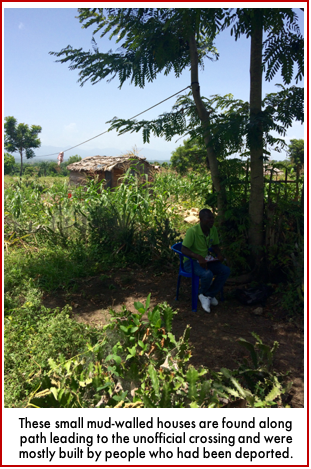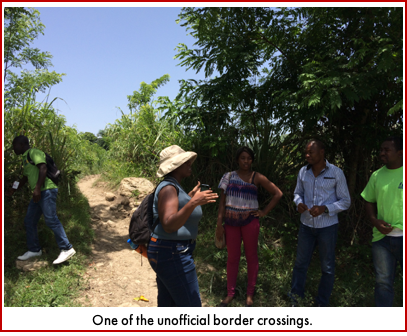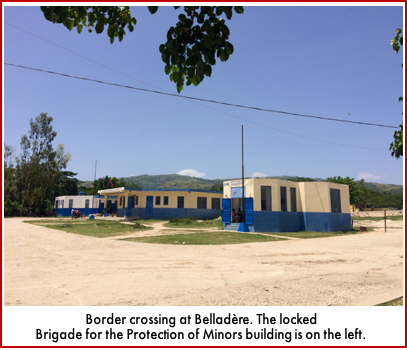The Unitarian Universalist Service Committee advances human rights through grassroots collaborations.
Report from the Haiti/Dominican Republic Border: For children, “stateless” means homeless, vulnerable
July 11, 2016
 In June 2016, Michael Kourabas, UUSC Associate Director for Program and Partner Support, traveled to Belladère, Haiti, just inside the border with the Dominican Republic. He and Kathleen McTigue, Director of the UU College of Social Justice, went there because this summer is a time of crisis for hundreds of thousands of residents of the Dominican Republic (D.R.), many of them children.
In June 2016, Michael Kourabas, UUSC Associate Director for Program and Partner Support, traveled to Belladère, Haiti, just inside the border with the Dominican Republic. He and Kathleen McTigue, Director of the UU College of Social Justice, went there because this summer is a time of crisis for hundreds of thousands of residents of the Dominican Republic (D.R.), many of them children.
The crisis is the result of what’s been called la sentencia, a 2013 Dominican Constitutional Court ruling revoking citizenship for anyone who cannot provide proof of legal access into the country for their ancestors – even for Haitian-Dominicans born there – dating back to 1929. It’s a draconian, discriminatory law designed specifically to forcibly remove people of Haitian descent, and it’s enforced by Dominican border guards – police and military personnel – whose training is supported by foreign aid from the United States. Dominican police and military routinely have been selecting people they assume to be Haitian (i.e. profiled because of their darker skin), sending them to detention camps without access to food or sanitation facilities, and – without notifying family members – deporting them to Haiti, a country these individuals never called home, and which is not equipped to provide for even their most basic needs once they arrive. It’s a human rights disaster that is unfolding right before our eyes.
UUSC became involved in human rights work on the island of Hispaniola following the 2010 earthquake in Haiti that killed 160,000 people and left 1.5 million more homeless. Our partner organization, Zanmi Timoun (“Friends of Children”), was providing humanitarian relief to earthquake survivors and had been helping abused and enslaved children in Haiti since 2001. Through our collaboration, we learned of the persistent discrimination against people of Haitian descent in the D.R., and the impending effects of la sentencia. With new support from UUSC, Zanmi Timoun began providing humanitarian aid to children caught in these mass deportations, helping them reunite with their parents, and working with Haitian government agencies to repatriate unaccompanied children.
Last month’s visit to the Haitian-Dominican border is the third UUSC on-the-ground assessment during the past year. What they found was not encouraging. Children – the most vulnerable among tens of thousands of deportees – remain at risk of arriving in Haiti with minimal – if any – access to food, clothing, shelter, or bathing facilities. Already, cholera has been reported at some border crossings.
 According to Michael, “When we arrived at the border, we noticed a Haitian Red Cross van leaving the official border crossing and heading to the Haiti Office National de la Migration (ONM) building, where Zanmi Timoun works alongside ONM to receive and document deportees. Ultimately, two vans would transport about 10 young men who had just been deported from the D.R. As soon as they were registered by Zanmi Timoun and ONM, we were told the young men snuck back into the DR using an ‘unofficial’ border crossing.”
According to Michael, “When we arrived at the border, we noticed a Haitian Red Cross van leaving the official border crossing and heading to the Haiti Office National de la Migration (ONM) building, where Zanmi Timoun works alongside ONM to receive and document deportees. Ultimately, two vans would transport about 10 young men who had just been deported from the D.R. As soon as they were registered by Zanmi Timoun and ONM, we were told the young men snuck back into the DR using an ‘unofficial’ border crossing.”
Had these deportees been minors, they would have faced an even graver situation. “In May, the government locked the Brigade for the Protection of Minors (BPM) building, which Zanmi Timoun had been using to assist recently deported minors,” Michael explained. “Unfortunately, Zanmi Timoun’s supplies remain locked in the BPM building, so they do not even have sanitary kits to give to deportees.” Much needs to be done.
Since 1974, U.S. military aid has been suspended to at least 11 countries for human rights violations. It’s time for us to stop being complicit and to increase pressure on the Dominican Republic to restore citizenship to people of Haitian descent.
 Because government policies in the D.R. are at the root of this crisis, UUSC believes taking action to stop these deportations is an important first step. That is why we are calling on our supporters to sign a petition to Secretary of State John Kerry demanding that the U.S. stop providing financial assistance to the D.R. military until it agrees to end this blatant violation of human rights. It’s an action the United States has taken before; since 1974, U.S. military aid has been suspended to at least 11 countries for human rights violations. It’s time for us to stop being complicit and to increase pressure on the D.R. to restore citizenship to people of Haitian descent.
Because government policies in the D.R. are at the root of this crisis, UUSC believes taking action to stop these deportations is an important first step. That is why we are calling on our supporters to sign a petition to Secretary of State John Kerry demanding that the U.S. stop providing financial assistance to the D.R. military until it agrees to end this blatant violation of human rights. It’s an action the United States has taken before; since 1974, U.S. military aid has been suspended to at least 11 countries for human rights violations. It’s time for us to stop being complicit and to increase pressure on the D.R. to restore citizenship to people of Haitian descent.
Pamela Sparr, Associate Director for UUSC’s Justice Building Programs, sums up the challenge before us. “In crises like these, when the very survival of vulnerable children is at stake, it is important for our country to do something on their behalf. Demanding that we stop providing aid to a military force that is abusing children as a matter of government policy is only the first of many things that need to be done. Challenging the forced removal of Haitian-Dominicans is an important first step, but even after we succeed in this task, we must continue our work to ensure the human rights of children in the Dominican Republic and Haiti.”

